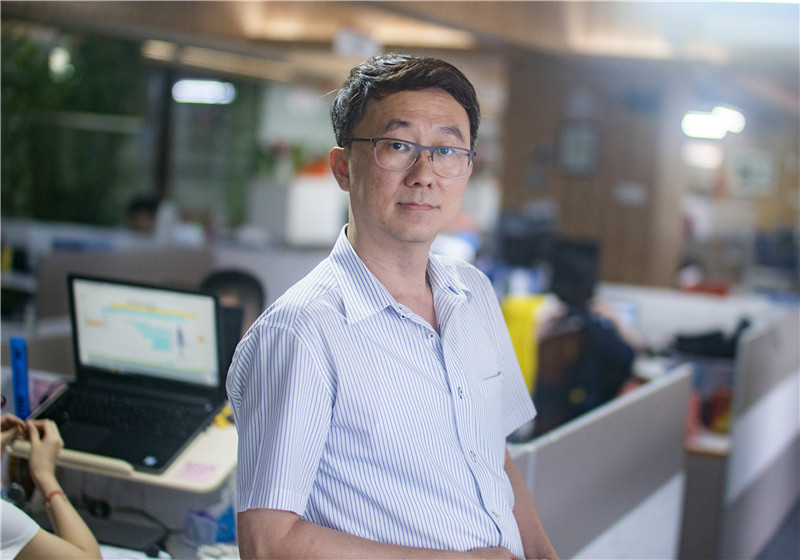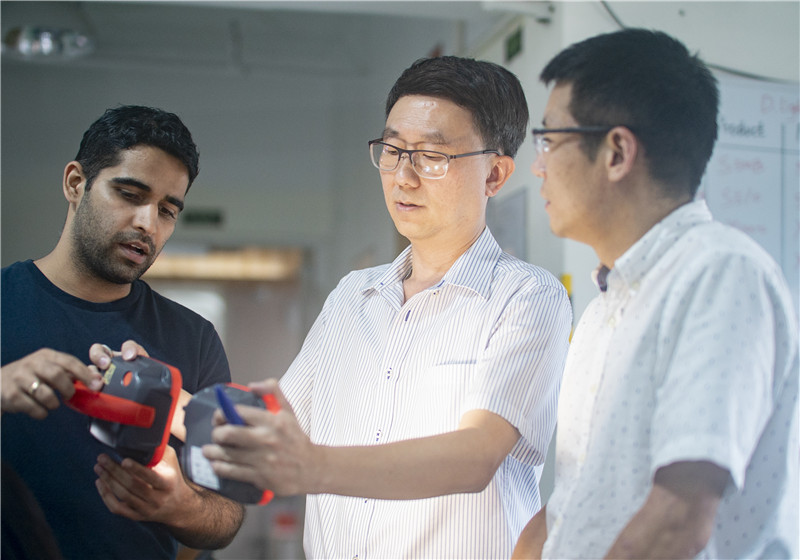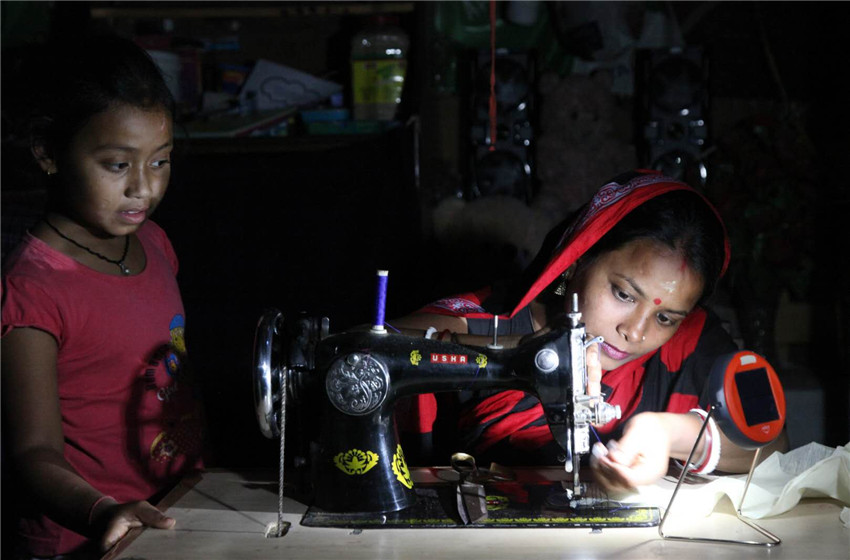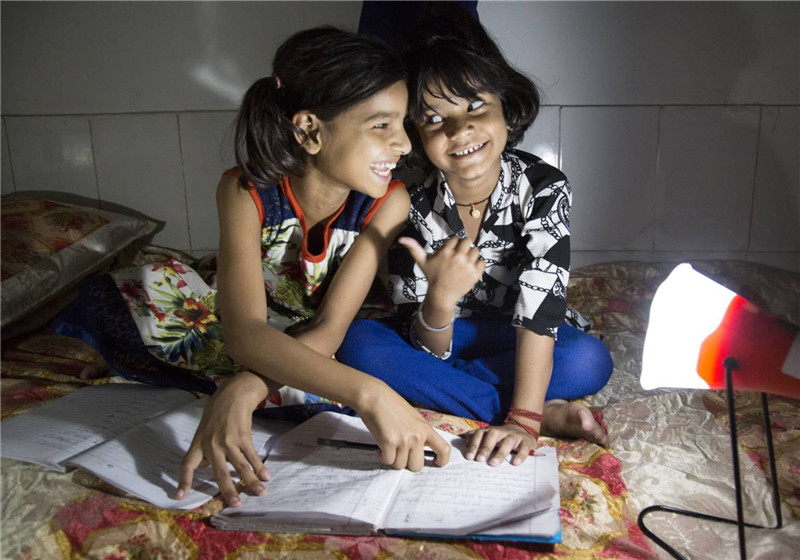Malaysian lights up off-grid areas
Writer: Doria Nan | Editor: Jane Chen | From: | Updated: 2018-09-12

Tan Ching Hock. Photo by Liu Xudong
Email of the writer: there_sun@163.com
The streets of Futian central business district are packed with skyscrapers, office workers and heavy traffic. Here, Malaysian Tan Ching Hock and 59 other people are bringing clean, safe and reliable solar power to people who still live in off-grid areas around the world.
The 50-year-old Malaysian, who prefers to be called CH, is the general manager of American company d.light design Inc.’s China branch.
Founded in 2006 by two Stanford Business School alums as a for-profit social enterprise, d.light manufactures and distributes award-winning solar lighting and power products designed to elevate the quality of life of people living in underdeveloped areas without electricity supply.
From its first solar-powered lamp, d.light has expanded its product suite to include everything from a solar-powered energy kit for an entire home including a low-powered television, solar fan, radio and torch.
d.light China moved to Futian District in 2013 as the district government was providing unique business opportunities and incentives, said CH. The Tianjian Innovation Building, where the company is located, is an incubator for startups. The district government offers financial support, and d.light China received 800,000 yuan (US$117,031) in government funds in 2016. “We are honored to be awarded as Futian District’s Advanced Technology Company and to have received Futian District’s International Friendship Award in 2014,” said CH.
From Fortune 500 company to social enterprise

Tan Ching Hock (C) discusses a product with colleagues. Liu Xudong
CH came to China and joined Flextronics Manufacturing (HK) Ltd. in 2002, since searching for a job in China was the general trend in his hometown of Penang, Malaysia, at the time. “China has a better environment and favorable industry policies,” said CH.
The company is an American multinational technology manufacturer that ranks as the third-largest global electronics manufacturing service (EMS) and original design manufacturer (ODM) company by revenue. CH was responsible for supply chain management in Zhuhai, Dongguan, Shanghai, and then Shenzhen. As the senior director of materials, he oversaw two factories located in Bao’an District from 2006 to early 2012.
Having worked at Flextronics for nine years, CH thought it was time for a change in early 2012. After leaving Flextronics, he was invited by a headhunter to join d.light China as a senior director of supply chain in 2013.
Many friends and former colleagues wondered why CH would abandon the halo of his Fortune 500 company to work at a for-profit social enterprise.
“I never regret,” said CH. “I am proud of our impact on people, which is a priceless treasure that money cannot buy.”
According to CH, life comes to a complete halt as soon as the sun goes down on people who do not have access to electricity. For lighting, their only choice is to rely on kerosene, which is toxic, dangerous and unreliable.

Lighting enables a woman to sew clothing at night. Courtesy of d.light China
Lighting improves education, which is the beginning of getting out from the hardships of life, according to CH. With an ultra-portable d.light solar-powered lantern, which normally costs US$5 to 20, children can study at home at night.

Children in an off-grid area do homework at night with one of d.light’s products. Courtesy of d.light China
Lighting can help the poor and needy get up on their feet. In late August, CH went to Patna, the capital and largest city of the state of Bihar in India, to do consumer-insight research.
“A customer told me happily that she earns more than her husband as she teaches others how to sew clothing at night,” said CH. A d.light lantern provides more than four hours of light on a full charge, allowing people to do something extra to contribute to the family income.
“Lighting can save people’s life. Maternal and newborn lives can be saved by utilizing solar-powered lights in off-grid areas,” said CH.
“There is no shortage of examples,” said CH, adding that he enjoys the satisfaction of helping those in need.
A big family
“When I first came to China, my mother told me that if the company pays you one dollar, you must repay the company 1.5 to 2 dollars,” said CH.
Always having these words in mind, when CH joined d.light China and was responsible for global product supply and new project management, he found that departments could not be expected to integrate and synchronize on their own.
CH then actively refined the organizational structure so that when different departments teamed up to produce an assembled product, they had perfect coordination in design, and technical and production capabilities.
“Every single job at a company has vast importance,” said CH. People’s needs are various and they think from different angles. To create a corporate culture, CH talked with every employee one by one to truly understand their inner thoughts. CH enabled everyone to understand the company’s general future direction so that everyone was willing and motivated to contribute more.
To help employees to get to know each other on a more personal level outside of the office, the company held events on a regular basis.
With a culture of caring that treats each employee as a trusted member of the family, seamless department integration is ensured at d.light, which is CH’s proudest achievement since he was elected as general manager through a democratic voting process.
Better quality and lower price
As the leading provider of off-grid solar solutions, CH aims to offer better products by improving the quality and making the price more affordable.
To create better products – in terms of quality and design – the company utilizes a complex lab equipped with millions of dollars worth of equipment to develop their products to meet the most stringent of standards, such as the multiple strict waterproof test, temperature resistance test and component life circle test.
To help reduce the retail price of the products, CH explained that reducing the costs in product design through raw materials is often the best way to proactively optimize costs. They are trying to improve their various products by using more shared materials so they can ask the raw materials suppliers for a lower price as they are buying a higher quantity.
As d.light doesn’t sell products in China, it is not well-known here. In order to get the company to become a leading social enterprise, d.light participated in the “Shenzhen × Lancang-Mekong” Initiative, which was initiated by the Shenzhen Foundation for International Exchange and Cooperation in conjunction with the governments of the Mekong River basin and relevant photovoltaics (PV) companies in Shenzhen.
The project plans to provide off-grid solar power supply products for 200 households in Bati County, Cambodia, and provide 100 sets for public places, such as the Bati County Community Center, temples and schools, with the aim of solving the problem of unreliable residential electricity.
“Till now, d.light has impacted over 82 million lives with our products in the developing world and has won extensive international acclaim,” said CH. “We’ll continue to be conscientious and help those in need.”